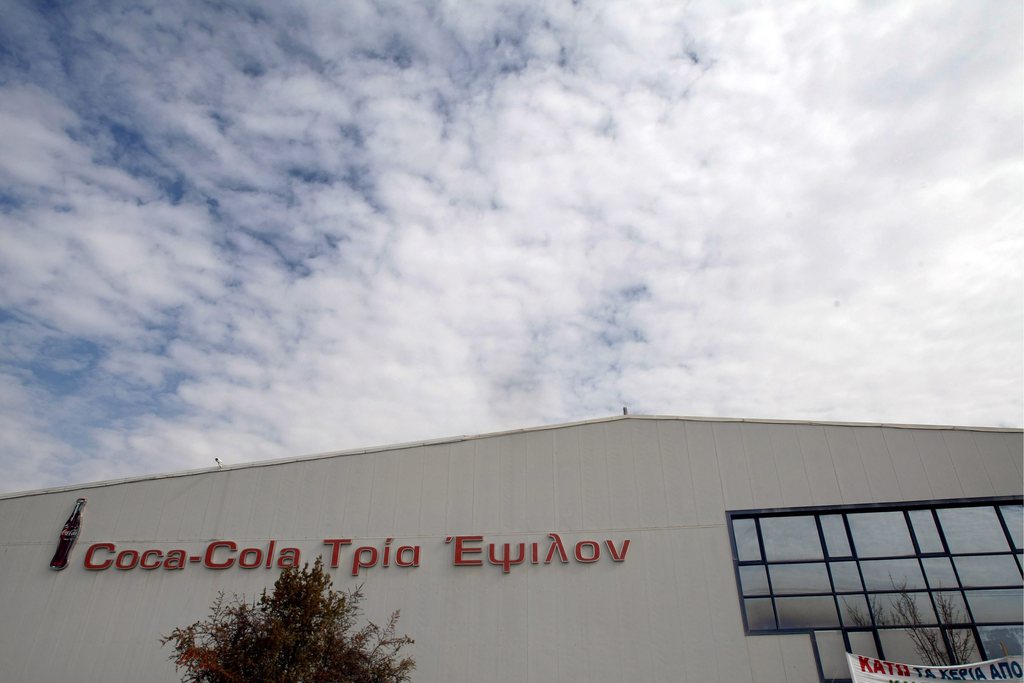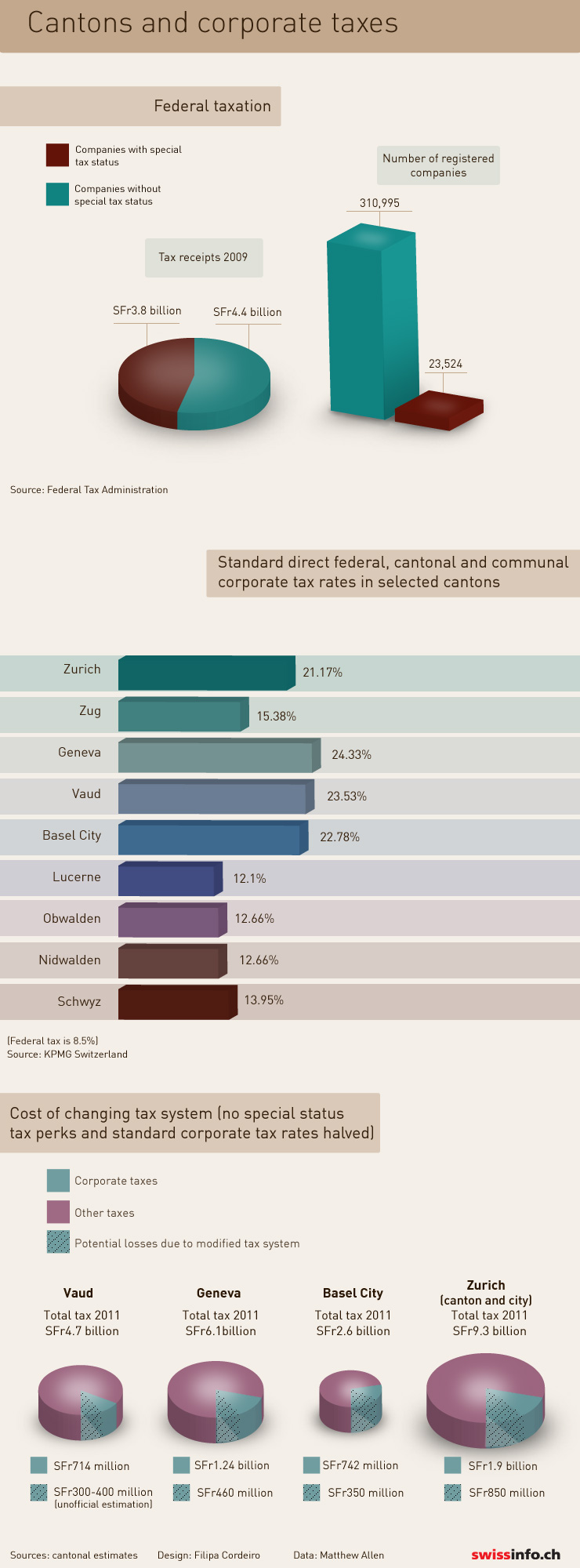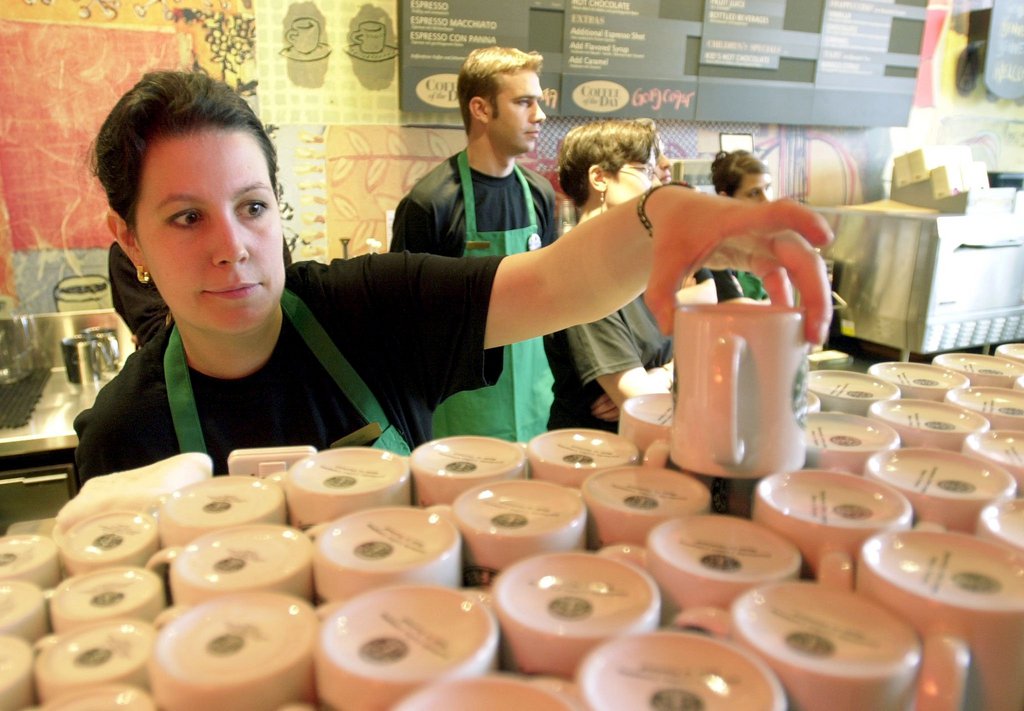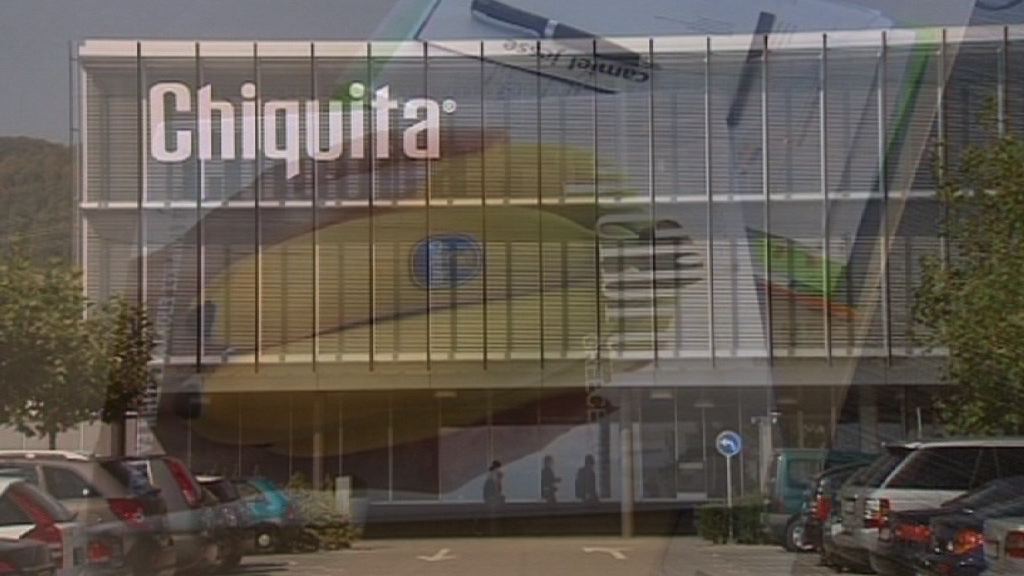Sparks fly as cantons face losing tax billions

In happier times, the relocation of a Greek-based Coca Cola subsidiary to Zug would have been met with unreserved Swiss joy. But the move in mid-October actually masks a deep crisis unfolding in Swiss cantons.
A showdown with the European Union over corporate tax breaks now has cantons at each other’s throats, with billions of francs of annual revenues at stake. On the line is also Switzerland’s reputation as a tax haven for multinationals.
Waiting on the sidelines are thousands of foreign holding firms that benefit from cantonal tax breaks on profits earned outside of Switzerland. The EU wants these financial perks, which tax domestic and foreign profits at different rates, to end, and the cantons fear a company exodus.
“There is an emerging understanding that these discriminations have to be renounced,” Thomas Cottier, a professor of international tax law at Bern University, told swissinfo.ch. “The alternative would almost certainly be to face retaliatory measures from the EU.”
The umbrella organisation representing Swiss-based international firms, SwissHoldings, is concerned. Three years ago, nearly a third of 400 members surveyed believed that Switzerland was becoming less attractive – with legal uncertainty over taxes one of the main reasons.
Counting the cost
“The study also reveals that other headquarter locations that compete with Switzerland (such as the Benelux countries, Britain, France and Singapore) are also keen to attract high value mobile company activities with attractive conditions,” SwissHoldings warned at the time.
Canton Geneva – home to many multinational headquarters, especially commodities firms – is also worried about the growing threat from the EU.
The canton recently revealed that it is home to 945 privileged companies (out of more than 23,500 in Switzerland), plus 136 of their subsidiaries, yielding SFr576 million ($616 million) in annual tax receipts.
The total contribution of these companies to the canton’s economy, including job creation and work for other companies, has been put at SFr3.7 billion, according to a Lausanne University report.
Slashing tax
One possible way out of the EU impasse would be for cantons to follow the lead of Neuchâtel, which last year cut contentious tax breaks and compensated by halving its standard corporate tax rate to remain competitive with international rivals, such as Ireland.
That solution may work well for Neuchâtel but would blow a hole in the budgets of other cantons that have far more holding firms and other resident companies.
Geneva has calculated that such a move would lead to a SFr460 million shortfall, Zurich has come up with a SFr850 million deficit, while Basel City reckons on losing SFr350 million. Observers calculate that Vaud would wind up between SFr300-400 million worse off.
Another complication to tax reform – and a cause of domestic friction – is a system of financial equalization that requires wealthier cantons to fund their less well-off neighbours.
The system directly links corporate tax income to the amount cantons have to pay out or receive from other cantons. The more income a canton raises, the more it has to pay out – with those cantons that cannot collect enough taxes to pay for infrastructure being on the receiving end of the handouts.
Predictably, those that pay out the most complain about this solidarity measure. But many beneficiaries point out that smaller cantons with low tax rates also attract foreign firms with the lure of amenities in nearby cities – paid for by other cantons.
This mismatch of needs has sparked a recent war of words between cantons that led to a sharp rebuke from Finance Minister Eveline Widmer-Schlumpf. “We must look again at this case on a more objective level,” she told Swiss television, also calling for cantons to work together rather than strike out alone.
Middle ground
But even a coordinated, harmonious approach cannot easily overcome the problem of how to redistribute income if some cantons are forced by the EU to radically change their tax systems – and potentially lose income as a result.
“Finding a domestic solution to the tax issue is certainly not easier than [finding a solution] with the EU,” Basel City finance director Eva Herzog told the Tages Anzeiger newspaper.
Due to their own unique situations, each canton must find its own solution to meeting EU demands, according to many observers. While some may be able to reduce rates across the board to remain competitive, others may be forced to be more creative.
One tactic may be to adopt other corporate tax “efficiency” measures already practiced by EU states. One prominent example is the so-called “IP box” that allows for a reduced tax rate on the revenues generated on intellectual property.
“Swiss cantons have no other choice than to find a middle ground with the EU, and this requires a huge effort,” said Cottier. “There is always the threat that companies could move out of Switzerland if the tax system proves less beneficial than before.”
Some cantons have for decades taxed the foreign derived profits of multinational holding, mixed or domiciliary companies at a lower rate than other firms.
In the 1990s Switzerland revised its federal tax laws to allow cantons to levy a lower tax on the foreign earned income of holding, mixed or domiciled multinational companiesclarify this system of taxing special status companies..
Domiciled companies are often referred to as “postbox” or “brass plate” firms because they have no physical presence or staff in Switzerland despite being incorporated there.
The postal address is used to funnel profits made in other countries to avoid paying tax and is the most loathed type of corporation by the EU.
In 2005, the EU objected that the practice violated principles of fair competition as defined by the 1972 free trade agreement with Switzerland. After first blanking this objection, then dragging its heels, Switzerland has been forced to the brink of conceding the point.
The federal tax office calculated that some 23,524 privileged firms were resident in Switzerland in 2009, out of a total of 334,519 registered companies.
The same source also found that in 2009, such firms stumped up SFr3.8 billion in direct federal taxes – virtually half of all the SFr8.2billion ($8.3 billion) corporate tax receipts collected that year.

In compliance with the JTI standards
More: SWI swissinfo.ch certified by the Journalism Trust Initiative




You can find an overview of ongoing debates with our journalists here. Please join us!
If you want to start a conversation about a topic raised in this article or want to report factual errors, email us at english@swissinfo.ch.